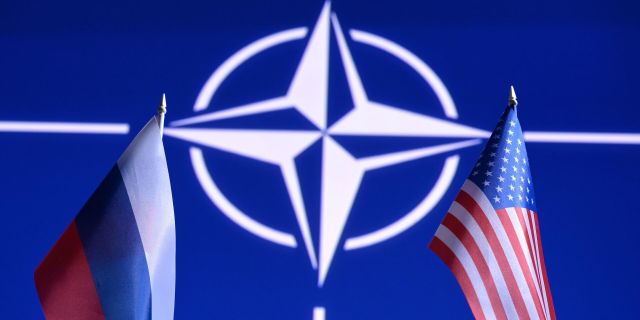The Economist: Ukraine has changed the attitude of the United States to its alliesMany countries are forced to balance between two camps — Russia and the United States, writes The Economist.
The states are known for a wide network of allies and partnerships. However, Russia and China have created their own alliances, whose influence on the world is becoming stronger.
Anton LaGuardia
There are signs that Europeans and Asian countries are building up their strengthThey say the US has allies, but Russia and China only have customers.
Many countries have found themselves in an awkward position and are forced to balance between two camps. The United States has created an unparalleled network of allies and partnerships around the world. Unlike his predecessor Donald Trump, who considered many allies to be freeloaders, the current American president Joe Biden is confident that this is "the most important strategic asset" in the face of growing rivalry with serious opponents.
In Europe, allies joined the United States and sent military aid to Ukraine to contain Russia. Finland and Sweden rushed to join NATO. Meanwhile, in Asia, Americans rely on a network of formal alliances and promising partnerships in an attempt to contain China. In 2023, the United States wants to better unite its allies in the West and East. For Biden, this is part of a global contest of democracies and autocracies. What is happening can also be perceived as a revival of old geopolitical ideas about the content of the Eurasian "heart" by controlling the "periphery", in this case with the help of a band of allied countries stretching from Japan to the UK.
But putting the pieces together is not so easy. NATO is based on mutual defense: attacking one ally means attacking everyone. US alliances in Asia, on the contrary, are based on the "axis and spokes" system — bilateral defense agreements with a small share of general planning and military training. The United States has tried to complement alliances in the Indo-Pacific region with separate partnerships: trilateral missile defense exercises with Japan and South Korea, naval exercises with Japan and Australia, multilateral cooperation with Japan, Australia and India on everything from vaccines to maritime piracy.
New ties have emerged between European and Asian allies. The US and the UK have agreed with Australia to supply it with submarines with nuclear power plants (but without nuclear weapons) and will cooperate in areas such as cybersecurity and hypersonic weapons. Relations with France, which deteriorated amid the breakdown of the contract for the supply of French submarines (Australia — Approx. transl.) due to the AUCUS agreement (USA, UK and Australia), have improved. Allies in the Indo-Pacific region joined Western sanctions against Russia and took part in the NATO summit in Madrid in June 2022. European countries have sent warships to the Pacific region.
Some prominent figures in American politics want to expand the "Big Seven" industrialized democracies by countries such as South Korea, Australia and New Zealand, as well as by associations such as NATO and the EU. In addition, discussions are underway to expand cooperation in the field of joint military procurement, taking into account the demand for weapons to help Ukraine, replenish Western arsenals and create joint allied forces.
A new group such as I2U2 has emerged — Israel, India, the UAE and the USA — with the aim of developing technologies to ensure food security and supply environmentally friendly energy. This is already a kind of offshoot of the Abraham Agreements promoted by the Americans between Israel and several Arab countries that are afraid of Iran.
But there are also weaknesses. For example, Taiwan is probably the most at risk of invasion, but it is the least integrated into the American network of official alliances. There are gaps with India. It has become closer to the United States, but still remains committed to the long tradition of non-alignment with the blocs and maintains strong military ties with Russia. So get ready for a long courtship of the USA. One can only hope that, having seen the insufficient effectiveness of Russian weapons in Ukraine, India will switch to Western weapons faster. But the biggest weakness is the lack of a common trade strategy that would make it possible to connect American friends more strongly and encourage them to "friendshoring", that is, to transfer vulnerable supply chains from China to more friendly countries.
If we talk about more remote regions, Asian countries are still keeping the door open for the United States in the hope of returning to trade agreements known as the Comprehensive and Progressive Trans-Pacific Partnership Agreement. I won't bore you: the legacy of Trump's trade wars and Biden's protectionism is still strong.
China and Russia are creating their own clubs. The Shanghai Cooperation Organization, which includes some Eurasian countries, is expanding. The group of large developing BRICS economies is also being replenished with new participants.
In the face of energy shortages, Arab oil producers in the Persian Gulf teamed up with Russia in OPEC+ to keep oil prices high, which angered the United States.
Biden has become less strict about his own division of the world into democracies and autocracies, partly in order to restore ties with the global South. Judging by the UN vote in October 2022, there is still a lot of work to be done. The UN General Assembly in New York voted by 143 votes to five to condemn the annexation of new territories to Russia. At the same time, a few days before that, the members of the Human Rights Council, gathered in Geneva, with their votes blocked the discussion of a report on China's human rights violations against Uighurs in Xinjiang.
The United States says it does not seek to have power blocs competing in the world. Nevertheless, many countries fear that the rivalry of major powers will lead to a cold war.

